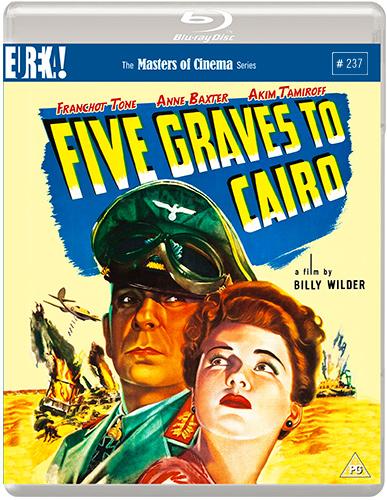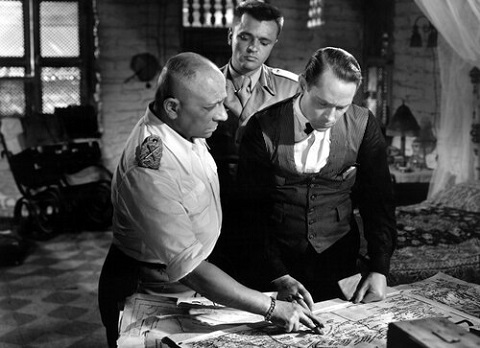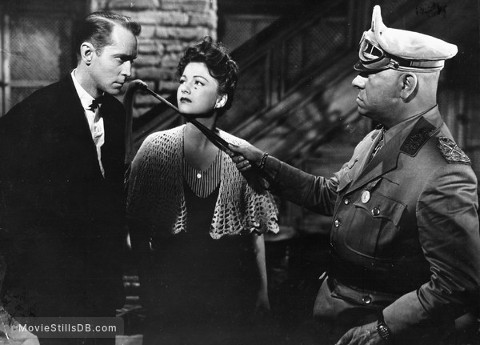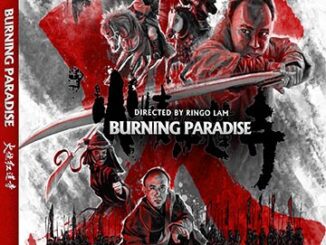Five Graves to Cairo (1943)
Directed by: Billy Wilder
Written by: Billy Wilder, Charles Brackett, Lajos Biró
Starring: Akim Tamiroff, Anne Baxter, Erich von Stroheim, Franchot Tone
USA
AVAILABLE ON BLU-RAY: NOW, from EUREKA ENTERTAINMENT
RUNNING TIME: 96 mins
REVIEWED BY: Dr Lenera
British tank Corporal John Bramble stumbles into The Empress of Britain, a Sahara oasis hotel after crawling through the desert during the North African campaign in 1942, just after the Germans capture Tobruk. Just a few minutes after he gets there, some Germans also arrive at virtually the same time headed by none other Field Marshall Erwin Rommel. Rommel and his command take up residence in the hotel run by nervous local Farid who lets Bramble assume the identity of a dead waiter. However, said waiter was also a German spy, so Bramble has to keep up a facade in front of these Nazis, while French maid Mouche has a brother in a German concentration camp and has her agenda for getting him out.…
General Bernard Montgomery had all but won the conflict between the British and the Germans in North Africa, and was transferred from to England to take command of the ground forces intended for the Normandy invasion. Brigadier Dudley Clarke Clarke located a look-alike, pre-war actor Lieutenant M. E. Clifton James, and had him study Montgomery’s appearance and mannerisms before getting him to actor then public visits to several Mediterranean bases disguised as Montgomery just a few days before D-Day in an attempt to convince the Germans that an Allied attack on Northern Europe was not imminent. The ruse didn’t really have a significant impact on German plans, but it understandably captured the imaginations of many and was dramatised in a book and a movie, both entitled I Was Monty’s Double. Perhaps less known is that Clarke was inspired to create this ruse after he watched Five Graves To Cairo. Following in the footsteps of Eureka’s release of 1948’s A Foreign Affair, it’s another lesser known work from the great Billy Wilder; but when somebody produces so many fine movies, it’s understandable that some would slop through the cracks, though Quentin Tarantino recently listing it as one of his top eleven films of all time has hopefully garnered it some interest. One can certainly why he would love this, and one can also see the influence of this dialogue-heavy, sometimes very tense, sometimes rather humorous work with limited settings on much his own work. It’s a darn fine piece in it own right and, while it was the next year’s Double Indemnity that would truly make Wilder’s name, one can already see a filmmaker already totally in control of the medium with this effortlessly smooth, witty and often bed-wettingly tense World War 2 suspenser.
This was Wilder’s second Hollywood film after the success of The Major And The Minor allowed him to set up and produce his own films at Paramount. It was based on Lajos Bíró’s play Hotel Imperial: Színm? négy felvonásban which was filmed in 1927 and 1939 as Hotel Imperial, though Wilder and his co-writer Charles Brackett updated the setting from World War 1 to World War 2, also altering some of the plot. some of it to reflect what was currently going on in the world. Wilder probably chose the play because Biro had often scripted for Ernst Lubitshch, one of Wilder’s favourite directors. Another of Wilder’s favourite directors Erich von Stroheim played Erwin Rommel. The day they met, Wilder said to him, “This is a very big moment in my life, that I should now be directing the great Stroheim. Your problem, I guess, was that you were ten years ahead of your time.” Von Stroheim replied, “Twenty.” Stroheim then insisted on “improving” his military costume and props to the extent of obtaining authentic German field glasses, a whisk and a 35mm Leica camera with actual film which were all fully functional. Ingrid Bergman and Simone Simon were considered to star as Mouche, while Wilder wanted Cary Grant to play Bramble, but Grant turned him down, the first of several times he did this. The exteriors of and around the hotel were at the Salton Sea, southwest of Los Angeles, while Yuma, Arizona, provided some desert footage. It was another success, which led Paramount to virtually give Wilder carte blanche on his productions for some time.
The titles play over a rather eerie shot of a distant tank slowly making its way further into the frame through the desert. Inside the vehicle, everyone is dead except for John Bramble who partly climbs out before toppling onto the sand dunes. He just about manages to drag himself to the Empress of Britain, with some nice filming here because neither he or we see the place until he’s almost right before it, before telling imaginary people what’s happened and finally collapsing before the manager Farid and the maid Mouche, everyone one else either having left or been killed by German bombing. Farid drags him to behind a deck even though Mouche wants to leave him because it’ll be better for them. In come the Germans, with Lieutenant Schwegler demanding some rooms for some top men. Schwegler seems to think that the air strikes from his side have no bearing on why the hotel isn’t in a very good state, doesn’t have all its amenities and lacks most of its staff, though he seems especially irritated when he hears waitor Davos was killed the previous night. There’s some great edge of seat stuff as Schwegler nearly sees Bramble when he goes to pick up a fan, though when he gets the table moved he’s gone. Wilder was always good at handling suspense with little effort, almost casually; it’s a shame that he lost interest in it later on in his career. Bramble quickly has the bright idea of posing as Davos, but is caught out immediately by Schwelger; however, it’s okay, because it’s only as a spy. Bramble has to pretend that he knows what he’s talking about to Schwelger, Rommell and Italian General Sebastiano. Sebastiano is basically a comic relief character, the constantly cheery, singing Italian being pretty stereotypical, as is Farid the continually worrying Turk, both very broadly played, though I think that viewers watching a film from 1943 ought to expect things like this and not get all offended!
All this would be tense enough though, especially when some British prisoners are brought in to stay and Bramble has to somehow find out where some hidden German supply dumps that will aid the conquest of Egypt are, even though he’d rather kill Rommel right there seeing as it’s easy to obtain a gun. However, there’s also Mouche, played with a pretty good French accent by Anne Baxter. She wants her brother out of a prison camp , and is prepared to use her body for this. Though it’s very subtly done by modern standards, it’s still fairly obvious that she offers herself to Rommel but Rommel says, “I don’t like a woman in the morning” so she has to settle for Schwegler, who reckons he can help her. While her hostility to Bramble is also an excuse for Bramble to defend the evacuation of Dunkirk in a speech that seems shoe-horned in, it does provide an interesting dimension to this quite strong female creation who clearly has no interest in actual romance, though she certainly has a heart. But then Rommel is also memorably and surprisingly favourably depicted for the time; he’s just a proud general who’s chivalrous to the British officers he’s captured and feels confident enough to divulge lots of secrets in a Twenty Questions game with said officers because, as he says, “my prisoners do not have a habit of escaping”. Even though Von Stroheim is better known as a director, he has a larger than life screen presence, while his role here seems a partial throwback to his one in Grande Illusion. And, while the script is full of great lines, Von Stroheim gets many of the best ones. “You gentlemen have six senses; we have only five, but we use them” says he to his British captives.
Wilder and Brackett already employed Wilder’s favourite plot device of a masquerade in their first film but develop it here, while they’re already experts at setting things up; if something is in the view of the camera, it will probably play a part in the plot later on. Bramble also has to do a lot of detective work, but you don’t many detective who are allowed to jump on a bed and bounce up and down with glee when he discovers the key to something. It’s actually all rather like some of King Hu’s films like Come Drink With Me, with mounting intrigue involving several sets of characters in one building [this must have been an influence on Hu’s work], only that we don’t end up with elaborate martial arts battles. The turns of the story are many though and there is some action, usually partly or even at one point totally obscured by darkness, with cinematographer John F. Seitz having a dry run for his stunning and hugely influential work on Double Indemnity which would essentially set the film noir look. It’s probably a shame for most modern viewers that the World War 2 propaganda returns with a vengeance towards the end [I love Alfred Hitchcock, but I usually omit that final minute of Foreign Correspondent whenever I watch it]; it does threaten to take one out of the story, though I still managed to stay involved nonetheless.
The weak link is really Franchot Tone; the actor, someone who played a wide range of roles but seemed to be typecast for a while as gentlemanly sophisticates, is mostly cold throughout and just seems out of place, not convincing as a soldier. He doesn’t even attempt an English accent, though I guess that shouldn’t be a bit deal in a film in which an Egyptian is played by a Russian and French person is played by an American. Oddly enough though, all the Germans except for Rommel are played by Germans, which does add a slight feeling of authenticity in the scenes involving them. Miklos Rozsa provides a typically fine score; his propulsive main theme, opening with a four note device which he’d use variations of in much later work, manages to feel martial without really being martial music, if that makes sense. The audio commentary tells us that much of the music wasn’t used, and some of it is also quite low in the mix, though we get the odd bit of full-on Rozsa emotion. I recall reading somewhere that Five Graves To Cairo is sometimes criticised for finally submitting to some un-Wilder-like sentimentality. But I’ve never seen a problem with sentimentality if it works, here employing the device of a parasol just like in that heartbreaking final goodbye in Wilder’s late masterpiece [and my joint favourite of his films with Double Indemnity and The Apartment; I adore all three equally] The Private Life Of Sherlock Holmes. If it genuinely moves, then how is this a problem?
SPECIAL FEATURES
*1080p presentation on Blu-ray for the first time in the UK from a brand new 4K restoration
This is the first time this film has been released on Blu-ray. There’s plenty of depth and contrast in the restoration, though perhaps some digital sharpening has been done; the image sometimes looks too ‘modern’. However, this shouldn’t interfere with your enjoyment of the film.
*Uncompressed LPCM audio (original mono presentation)
*Audio commentary by film scholar Adrian Martin
Adrian Martin has become one of the my favourites of the film scholars who do these things, and this is probably his best track yet. The mixture of appreciation, analysis and appreciation, along with some help from Brackett’s diaries, is perfectly balanced, and he never loses the listener or becomes dry despite often getting very technical. He especially praises the set and the cinematic way that it’s used, compares this version to the play and it’s previous two adaptations, and reminds us of how quick films were put together back then; it was only ten months between the beginnings of pre-production to release. Interesting to here that Brackett felt that Tone let things down a bit too.
*Five Graves to Cairo” episode of Lux Radio Theatre, originally aired in 1943, starring Franchot Tone and Anne Baxter [68 mins]
What with Tone and Baxter reprising their roles, listening to this is very much like watching the film again, even though the other cast members are different except for Fortunia Bonanova as Sebastiano, and even though of course the non-dialogue bits are skimmed over. But it’s fun to hear Cecil B. De Mille introducing and narrating, and asking a “housewife” on how to save fat for the war effort.
*Billy Wilder on Five Graves to Cairo [11 mins]
This is the first part of Billy Wilder Speaks, Volker Schlondorff’s series of interviews with Wilder which are all on Eureka’s release of The Lost Weekend. It briefly covers his childhood and early Hollywood career, with some stuff on Ninochta which he co-wrote and Five Graves To Cairo; he recalls how Stroheim liked to boast about his army career which was mostly ficticious.
*Theatrical trailer
*A collector’s booklet featuring new writing by critic Richard Combs; and an archival article from 1944 about Wilder and Charles Brackett
Though not one of Eureka’s more packed Blu-rays, this release still has a very notable commentary which is one of the best it’s kind, and the film is yet another cracker from Wilder. Highly Recommended.











Be the first to comment